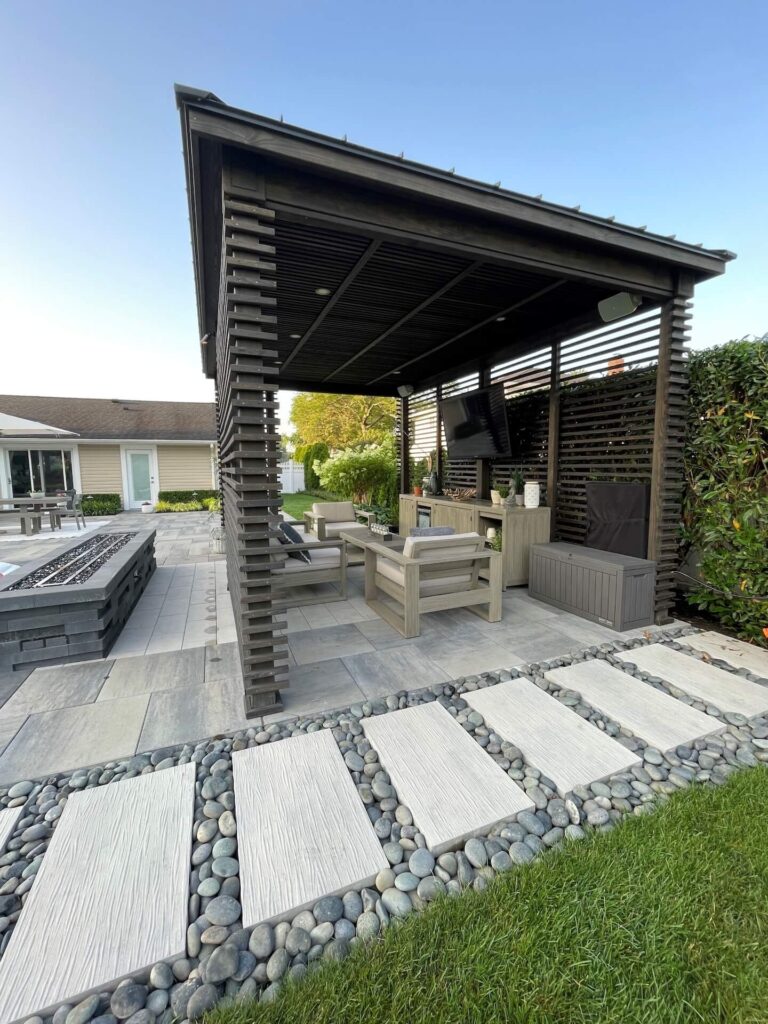When choosing the best surface for your home’s driveway, two popular options often stand out: interlock and concrete. Both materials offer unique benefits—and the right choice depends on your priorities, budget, and aesthetic preferences.
Whether you’re updating an older home in Toronto, building a new property in Vaughan, or renovating in Mississauga, understanding the difference between these driveways will help you make a smart, long-term investment.
Let’s explore how interlock and concrete compare in terms of appearance, durability, cost, and maintenance so you can confidently decide what works best for your home.
The Basics: What Are Interlock and Concrete Driveways?
Interlock driveways use individual pavers—usually made of concrete, brick, or stone—placed tightly together in a specific pattern. These pavers sit on a compacted gravel and sand base, allowing flexibility and drainage.
Concrete driveways are poured in one solid slab (or in sections), usually made of cement, sand, gravel, and water. This material sets into a hard, smooth surface that’s known for its strength and simplicity.
Each style offers a unique visual and functional appeal—and your location in the GTA, Brampton, or Richmond Hill may also influence which option is more suitable.
Durability and Longevity of Driveways
Durability is a top concern for homeowners installing new driveways. You want a surface that can handle weather, weight, and wear—especially in Ontario’s freeze-thaw cycles.
Interlock
-
Flexible surface reduces cracking
-
Pavers can be replaced individually if damaged
-
Excellent drainage helps prevent water damage
-
Ideal for areas like Markham and North York with clay-heavy soils
Concrete
-
Strong and stable surface
-
Prone to cracking in cold climates without proper installation
-
Repairs can be tricky and noticeable
-
May require sealing to extend life
While both options are strong, interlock driveways tend to handle shifting ground and seasonal changes better over time.
Appearance and Design Versatility
When it comes to curb appeal, the right driveway can elevate your home’s exterior.
Interlock offers unbeatable design flexibility. With endless colors, patterns, and textures, interlock pavers give you complete creative control. From sleek modern styles to rustic stone looks, interlock can match any home aesthetic in Etobicoke or Milton.
Concrete is more limited but still customizable. You can choose from stamped patterns or stained finishes, but options are fewer than interlock. Standard concrete offers a clean, minimalist look that many homeowners in Toronto prefer for modern properties.
Cost Considerations: Installation and Repairs
Upfront cost is another key factor when comparing driveways.
-
Interlock Driveways: Typically cost more to install due to the labor involved. However, they offer lower long-term maintenance costs because individual pavers can be easily replaced.
-
Concrete Driveways: Generally cheaper initially, especially for large areas. But cracks, repairs, and eventual resurfacing can increase the total cost over time.
In the GTA, interlock is often seen as a premium choice, while concrete offers a budget-friendly option for larger residential properties.
🔗 Learn more about driveway costs on HomeStars
Maintenance and Seasonal Care
Maintaining driveways is part of owning a home—especially in snowy Canadian winters.
Interlock requires regular sweeping and occasional re-sanding of joints, but pavers are easy to fix individually. Snow removal is also easy with flat paver styles.
Concrete needs to be sealed every few years to protect against salt and moisture. When cracks appear, repairs are visible unless you resurface the entire slab.
For homeowners in Burlington or Oakville, where winters can be harsh, interlock may offer better resilience and easier repair.
Environmental Impact and Drainage
Drainage is critical in areas like Scarborough or Pickering, where heavy rain can cause pooling and erosion.
Interlock is a more eco-friendly choice. Its permeable design allows water to seep through joints, reducing runoff and promoting groundwater recharge.
Concrete is less permeable, which can lead to pooling unless a drainage system is installed. Some newer concrete products are porous, but they come at a higher cost.
If you’re aiming for a sustainable landscape design, interlock has a clear advantage.
Which Is Best for Your Home?
Choose interlock driveways if you want:
-
A customizable and elegant look
-
Flexibility and easier repairs
-
Better drainage and eco-friendliness
-
Long-term durability for tough Ontario winters
Choose concrete driveways if you want:
-
A budget-friendly installation
-
A smooth and simple look
-
Low initial maintenance
-
A fast project timeline
Ultimately, the best choice depends on your lifestyle, design goals, and budget. At BYG Landscaping, we install both interlock and concrete driveways across Toronto, Vaughan, Brampton, and the entire GTA, offering expert guidance from consultation to completion.
Final Thoughts
Both interlock and concrete driveways have their pros and cons. Interlock offers timeless style and flexibility. Concrete provides a solid, straightforward solution.
Before making a decision, consider how your driveway will perform over time—and how it complements your home and local environment.
FAQs: Interlock vs Concrete Driveways
1. Which is more durable—interlock or concrete driveways?
Both are durable, but interlock driveways perform better in cold climates due to their flexible base and easy repairability. Cracks in concrete can worsen over time.
2. Are interlock driveways worth the higher cost?
Yes. While the upfront cost is higher, interlock driveways offer long-term savings on repairs and last 30+ years with proper maintenance.
3. Do interlock driveways require sealing?
No, sealing is optional. Some homeowners in Toronto choose to seal their interlock to enhance color, but it’s not necessary for structural integrity.
4. How long do concrete driveways last?
Concrete driveways typically last 20–25 years if properly maintained. In colder areas like Vaughan, sealing and crack repairs are crucial to longevity.
5. Can I customize the look of my driveway with either material?
Yes. Interlock offers more design options with patterns and colors. Concrete can be customized with stamping or stains, but choices are more limited.

